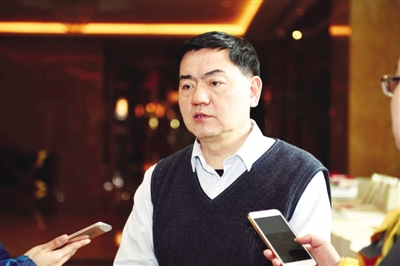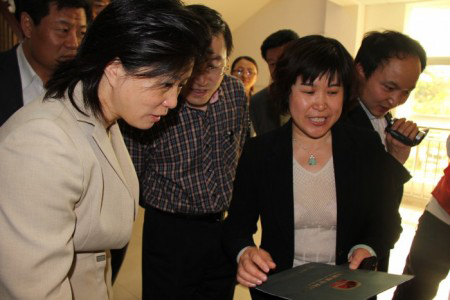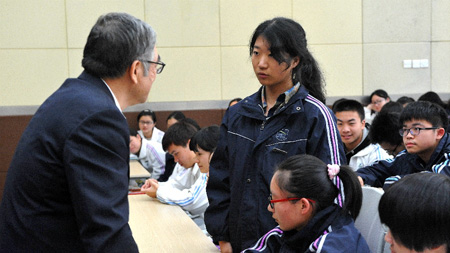The state provides fair and quality education to realize everyone’s dream.
The report of the 19th National Congress of the Communist Party of China pointed out that building an educational power is the basic project for the great rejuvenation of the Chinese nation, and it is necessary to give priority to education, speed up the modernization of education, and run a satisfactory education for the people.
A set of "heavy" data in the past five years silently tells how the country continues to increase investment in people’s livelihood and adhere to the priority development of education in the case of financial constraints. Fiscal education funds accounted for more than 4% of GDP, the nutrition improvement plan benefited more than 36 million rural students, the number of students enrolled by key universities in rural and poverty-stricken areas increased from 10,000 to 100,000, and the number of students from various schools with poor families reached 430 million …
As the largest education system in the world, the reform and development of China’s education is related to the sense of acquisition and happiness of 1.3 billion Chinese, as well as national progress and national rejuvenation. At present, it is the "two sessions" of the country, and the deputies engaged in education work are actively speaking out to be "woodpeckers" for the healthy development of education in China and contribute wisdom to the development plan.
This year’s government work report proposes to develop fair and quality education, increase the supply of preschool education resources through multiple channels, eliminate the "large class size" in cities and towns, and focus on solving the problem of heavy extracurricular burden of primary and secondary school students … The report actively responds to the educational concerns of ordinary people.

Li Heping was interviewed and talked about his personal feelings about the government work report.
Report responds to people’s educational concerns
Li Heping, member of Chinese People’s Political Consultative Conference and director of Anhui Provincial Department of Education, has drawn many important points in the government work report. "In the past five years, fundamental changes have taken place in the economy, society, urban and rural appearance and human appearance, laying a very good foundation for China’s further development." As an educational administrator, he has persisted in research and paid close attention to the development of education in China for many years.
At present, the people still have a strong reaction to "it is difficult to enter the park" and "it is expensive to enter the park". Li Heping said that as a child, from a natural person to a social person, preschool education is the first stop. After the implementation of the comprehensive two-child policy, the demand for preschool education is huge. This year, he focused on the reform and development of preschool education. Like Li Heping, the proposal brought by Pang Lijuan, deputy to the National People’s Congress and vice president of China Education Policy Research Institute, this year also focuses on preschool education. She said, "Although preschool education has made remarkable progress in recent years, it is still the weakest link in the education system."
With the popularization of compulsory education, from "learning" to "learning", people expect higher quality education. This year, the state has written "eliminating large class sizes in cities and towns" into the government work report, which is a solemn commitment to the people and shows the country’s courage to face the problem directly. Zhu Yongxin, deputy to the National People’s Congress and vice chairman of the Democratic Progressive Party Central Committee, has always been concerned about the problem of large class sizes in primary and secondary schools.
In addition, this government work report has responded to important issues related to people’s sense of gain and happiness all over the country, such as the heavy extracurricular burden of primary and secondary school students, the drop-out of rural students, and the construction of high-level universities in the central and western regions.

Pang Lijuan entered the school for investigation.
On behalf of the Committee members, they actively "offer suggestions"
Pang Lijuan said, "The problem of insufficient imbalance in the development of preschool education is still outstanding, especially the management system, investment system, kindergarten system and teacher policy are seriously lagging behind. These are closely related to the lack of a "Qin Education Law" in China and the lack of clear regulations on deep-seated and key issues. " She suggested that the basic principles of public welfare and universal benefit should be adhered to in legislation, and preschool education should be included in the basic public education service system and important social public undertakings. Li Heping also believes that "pre-school education is still the short board of basic education". To better solve the problems of public welfare and universal benefits, the government should play its main role to achieve public welfare and universal benefits.
With the rapid progress of urbanization, large class teaching in cities and towns has become a bottleneck restricting the improvement of basic education quality. Zhu Yongxin paid special attention to this issue in the motion. He believed that "the unbalanced allocation of educational resources and the’ school choice fever’ are the fundamental reasons for the problem of large class sizes in urban schools." He suggested that the state should coordinate the allocation of resources and rationally plan the layout and construction of schools from the height of compulsory education in urban and rural areas. At the same time, the change of school size and class size will be included in school supervision and a reporting platform will be set up.
There is such a couplet circulating on the Internet: "Part One: I am not afraid that my deskmate is a schoolmaster, while Part Two: I am afraid that schoolmasters will have a winter vacation, and the gap will widen", which shows the anxiety of city people in the face of extracurricular training. Netizen "Aurora" said that it is a good idea to "focus on solving the problem of heavy extracurricular burden of primary and secondary school students" in the government work report. It is necessary to free children from heavy extracurricular burden and have more time to participate in social practice. While studying in thousands of books, I can take Wan Li Road. Ye Rensun, deputy to the National People’s Congress and director of the Jiangxi Provincial Department of Education, said that schools and families should work together to cultivate children’s interest in learning and improve their learning ability, and extracurricular training institutions are only a useful supplement to children’s quality education, not a tool for taking exams.

Zhu Yongxin went to middle school to investigate.
"Develop fair and quality education"
"After listening to the report made by Premier Li Keqiang, I feel very excited and more confident." He said that as an old member who has participated in the discussion of state affairs for eleven years, he was particularly impressed by two sentences. The first is "developing fair and quality education", which is the orientation of China’s education reform and development policy after years of exploration. At this stage, it is very appropriate to pursue the simultaneous development of fairness and quality. The second is to "run a satisfactory education for the people, so that everyone has equal opportunities to change their own destiny and realize their life dreams through education." This sentence tells the true meaning of education and the expectations of ordinary people.
Fairness and quality are difficult problems to be solved in the current national education reform and development. Li Heping said that China has a vast territory and unbalanced development is a common phenomenon. Excessive imbalance will lead to the imbalance of opportunities, processes and results, especially in the compulsory education stage, which is unacceptable to ordinary people. Therefore, fairness must be emphasized at this stage. How to improve quality while giving consideration to fairness? He analyzed that different students have different evaluation criteria for quality. For example, higher education places more emphasis on innovation and knowledge guidance, while compulsory education places more emphasis on the requirements of common goals.
Zhu Yongxin believes that the state should highlight the general idea of urban-rural integration development. Taking "balanced development of education" and "improving the quality of education" as the primary goals, we will make overall plans to form a new pattern of regional compulsory education development integrating urban and rural areas.

Zhou Hongyu investigates in the countryside.
Zhou Hongyu, a professor at Huazhong Normal University, has served as a deputy to the National People’s Congress for four consecutive years. In the blank space of this year’s government work report, he wrote notes and drew a line under the sentence "Develop a fair and educated quality". "Today, education in China has entered a new era. I believe that the future education in China will strive for higher quality, fairer, more distinctive and more sustainable development, and create greater glories. "